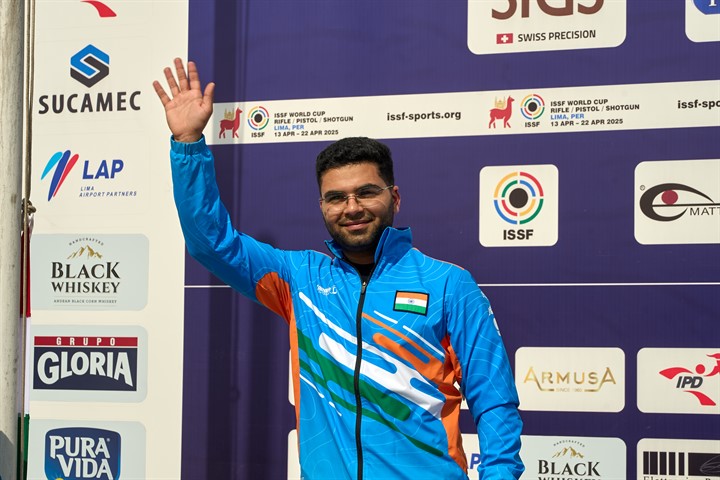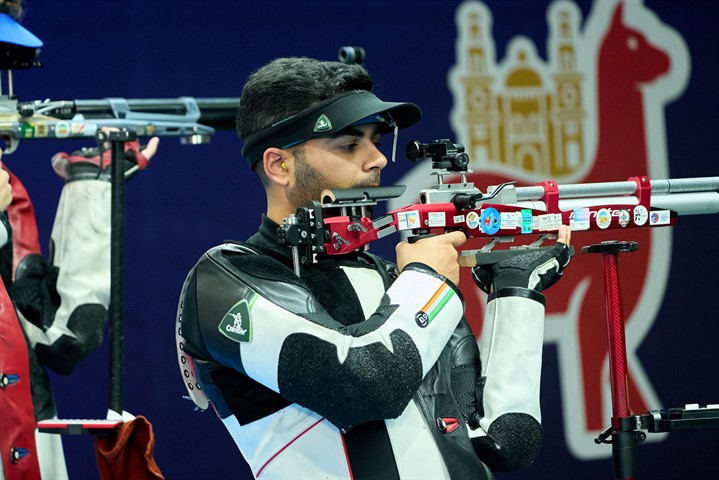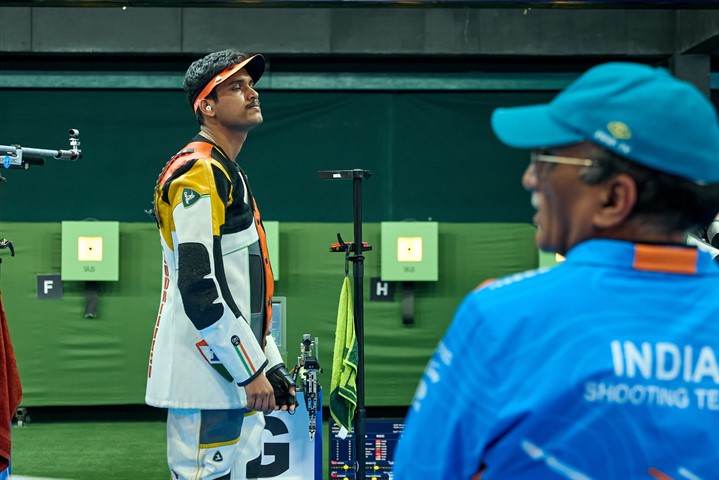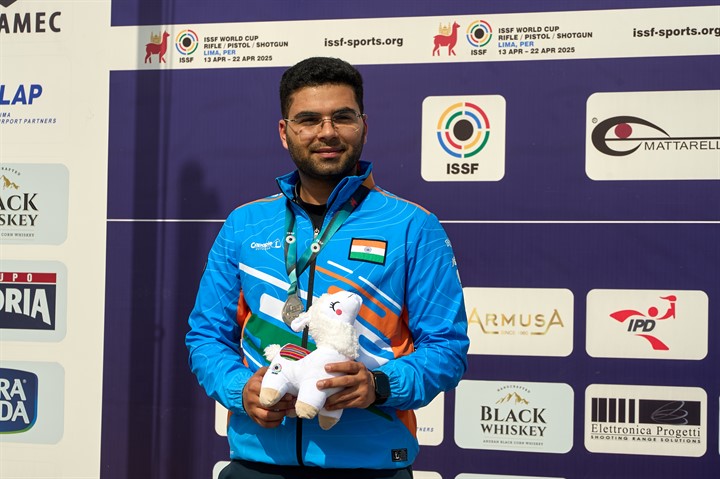
A RevSportz Exclusive
Ace Indian shooter, Arjun Babuta recently in the ISSF World Cup in Lima won a silver medal in the 10m Air Rifle breaking his medal jinx since the Paris Olympics 2024, through the National Games 2024. In this interview, he reflected on his campaign in South America, how tense was the final in Lima, the role of the Federation, his plans ahead and more.
Rohan Chowdhury: Hi Arjun, welcome to RevSportz, and many congratulations on winning silver at the ISSF World Cup in Lima. First off, I want to ask you — after the near miss at the Paris Olympics, then the journey through the Nationals, and now finally back on the podium at an international tournament — how did it feel at that moment? And what was the process like?
Arjun Babuta: Thank you so much. It definitely felt a bit different this time. I gained a lot of confidence after the Paris Olympics, and since then, I’ve been trying new things — new techniques, a new mental approach. I really like the way things are working for me right now. This medal is a kind of boost, a validation of the direction I’m taking with my shooting. I feel really good about it.
Rohan: After your name was announced in Lima, you celebrated quite enthusiastically — you raised your gun and showed a lot of emotion. In your interview with the ISSF media, you also mentioned that these are moments worth celebrating. Could you take me back to that moment and walk me through it?
Arjun: Definitely. Actually, someone once asked me why shooters don’t really celebrate their victories. And it struck me — it’s true. We are so much “in the zone” during competitions, so focused and internalised, that we often forget to celebrate the moment itself.
This time, I had actually made up my mind: if I won, I would celebrate properly — not just for myself, but to change that pattern for the future. So yes, when my name was called, I allowed myself to feel that joy. It was important for me.

Rohan: It was a very close final — just a 0.1 difference between you and the gold medal. How tense were those last few shots?
Arjun: Honestly, I wasn’t competing against anyone but myself. I wasn’t even fully aware of the scores; I was just focused on following my own process. The silver medal was just a result of that mindset. So it’s okay — the focus was purely internal.
Rohan: After the Buenos Aires leg where you finished seventh, what were the changes you identified that needed to be made before Lima?
Arjun: There were a few technical adjustments I realised were necessary after Buenos Aires, especially concerning my muscle memory — the way my body reacted under pressure.
In the qualification round in Lima, during the last 20 shots, I consciously treated them like a final — manipulating a few things and closely observing my reactions. That helped me spot where changes were happening physically. I focused more on relaxing certain muscles, improving my balance, and sticking to the technical aspects of my shot. I carried that same approach into the final — and it worked.
Also Read: Sift Kaur Samra: I was very happy with IOC’s Standing-Only Finals decision for LA28
Rohan: Coming back to the broader process — you’ve missed podiums by the narrowest margins multiple times. How tough is it to stay mentally strong and keep grinding until you finally succeed? How do you stay mentally fit?
Arjun: Yes, there have been quite a few matches now where I finished fourth or fifth — so close, yet not quite there. But honestly, I’m working on aspects of my shooting that will serve me better in the long run. These placements don’t discourage me because I know I’m improving, and I believe in my abilities.
As for motivation, I simply love shooting. That’s the biggest reason. Everything else — medals, fame, money — is secondary. Shooting itself keeps me going, so there’s never a question about motivation.
Rohan: One thing I’m curious about — during the final, there was that unfortunate technical glitch with Rudrankksh. You were competing alongside him. When something like that happens to a teammate, does it affect your mindset or put extra pressure on you?
Arjun: Not really, because again, I was focused only on my own shooting. Yes, there was a thought — that two Indians were in the final and at least one of us must win a medal, hopefully gold. But when Rudrankksh faced that technical issue, I reminded myself to stay composed and stick to my process.
Of course, I felt bad for him — he’s a very fine shooter, and I learn a lot from him. But in that moment, I had to focus on my own game.

Rohan: Speaking of Indian shooters, overall, the contingent performed really well across Argentina and Peru. How would you describe the team’s overall performance in South America?
Arjun: Honestly, this is just a trailer. The Indian shooting team is extremely strong right now. I’m sure we’ll win many more medals — not just at World Cups, but at major events like the Asian Games and the Olympics too.
The World Championship next year is also a big target, and we’re very hopeful for a lot of medals there as well.
Rohan: We also saw a lot of youngsters making a big impact — like Suruchi, Arya and Simranpreet who won a medal on the last day. How do you see the emergence of these young talents?
Arjun: It’s great to see. New talent only brings positive energy to the circuit. There’s no threat to seniors — it’s a healthy competition. In fact, seniors can learn a lot from juniors. The spirit, the hunger, the drive they bring is really motivating. Personally, I always try to learn something new from any shooter, regardless of age or experience.
Also Read: Wanted to visit Messi’s house but there were riots: Rudrankksh Patil
Rohan: A word about the federation — how has their support been? Also, given the intense competition at national trials, with even medallists sometimes missing out on teams, how do you see the current scenario?
Arjun: The federation is doing a great job right now. They’re open to feedback, they ask shooters if anything needs attention, and they’re responsive — which is very important. And yes, the competition in India is insane.
If you compare scores at national trials to World Cups or even the Olympics, sometimes the trial scores are higher. This level of competition at home actually makes it easier to win internationally because we are so well-prepared.
I expect even more competition in the next few years with so many young shooters coming up after the Paris Olympics. It’s very healthy for Indian shooting.
Rohan: You have the Munich World Cup coming up, and then the third and fourth national trials, plus the Asian Championships and the World Championships in Cairo. How are you planning the next few months?
Arjun: I was actually discussing this with my coach just before our call. We’re strategising carefully. I’ll probably skip the upcoming national trials because there are a lot of back-to-back international tournaments. And the scores from those international events will still count toward my national ranking.
My immediate focus is the World Cup in Munich, which is always a very high-level event. Almost every top shooter participates because Munich is like a hub for shooting — you get all the equipment, testing facilities, and strong competition.
After that, the Asian Championship and the World Championship are my big targets.

Rohan: Apart from competitions, did you get any time to enjoy Argentina and Peru?
Arjun: Definitely. I explored a bit — tried the local food, went for walks along the beaches in both countries. One thing that stood out to me was how much people there focus on fitness. It’s a part of their lifestyle.
It made me realise that in India, too, we have so many wellness traditions like yoga — we just need to embrace them more. That balance between work, life, and self-care is something I’d love to see more of back home.
Rohan: Before we wrap up — what’s the one key takeaway from this South American campaign that you’ll carry forward to become a better version of yourself?
Arjun: The biggest takeaway is confidence in my approach. The process and techniques I’m working on are going well, and I trust them more now.
For this year, I’ve given myself a few specific tasks, and I’ll stick to them. I feel really positive about the path I’m on.
Rohan: Thank you so much, Arjun. It was lovely talking to you again — we spoke during Paris too — and this conversation was just as wonderful. We wish you all the very best for Munich and beyond. Keep winning more medals for India.
Arjun: Thank you so much, Rohan. It was a pleasure talking to you.
Exclusive 🚨
“There’s a notion that shooters don’t celebrate their victories. I had to change that” — @arjunbabuta on his celebration after his silver medal in the @issf_official World Cup in Lima.
Getting back on the podium after long, takeaways, plans ahead, next tournaments… pic.twitter.com/YJ4WlC0qKU
— RevSportz Global (@RevSportzGlobal) April 28, 2025



